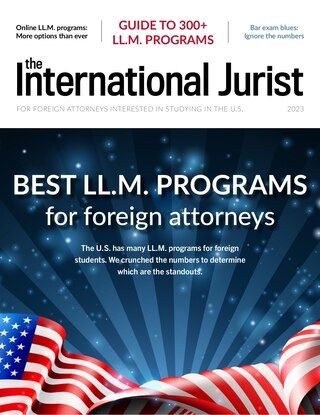There are five frameworks under which foreign lawyers can practice law in the US: (1) a license that allows the practice of foreign law on US soil; (2) a rule that allows temporary transactional work or arbitration or mediation by foreign lawyers; (3) a rule that permits foreign lawyers to apply for pro hac vice admission; (4) a rule that permits foreign lawyers to serve as in-house counsel, and finally; (5) full admission as a regularly licensed lawyer in a US jurisdiction.
While it is important to know the circumstances under which you are allowed to practice in the U.S. as a foreign lawyer, it is also important to know what type of positions offer the best opportunities to get employed. Too many LL.M. students focus on the first question and assume that once they have bar admission, job gates will open. This is not the case.
When looking for positions that are suitable for a lawyer with an international background we always have to keep one question in mind: Why should a U.S. employer hire an international lawyer rather than a domestic lawyer — what is the motive or special advantage that the foreign lawyer offers?
A foreign LL.M. student remains an international lawyer even after he or she has graduated from an LL.M. program and even after he or she has been admitted to a U.S. bar. This is a tough pill to swallow for many LL.M. students since they like to think of themselves as fully equal lawyers once they are admitted. Even though they are with regard to their eligibility to practice, in the eyes of a U.S. employer, they are not. U.S. employers have a large pool of domestically educated attorneys from which to choose, lawyers with U.S. college degrees and law degrees. Why choose someone with one year of U.S. education over someone with many years more? They only do so if they need the international acumen or something else special that the foreign lawyer brings to the table. An LL.M. student who understands this and knows how to play this card is in a good position. Too many LL.M. students end up being a second class domestic lawyer. This makes the job search even more challenging in a market that is overflowing with J.D. graduates.
Let’s look at some position categories:
Internship
Internships are on the job training that are either paid or unpaid, in the latter case often in exchange for credit towards your degree. Internships offer good opportunities to gain exposure to U.S. law practice and law firm culture. The possibility of full-time employment is rather small but I have seen it happen. I do not see any reason why an LL.M. student should not be able to secure an internship, unless the timing is off.
Externship
Differences between internships and externships are generally subtle but when it comes to LL.M. students they tend to become even more subtle. The externship may be shorter in duration and some law schools offer them during the semester, often in connection with a thesis or a seminar. Everything said with regards to internships is true here.
Foreign Associate
Foreign associate programs are created by law firms to invite foreign lawyers to their U.S. offices for a limited period of time. They come in different names, such as Visiting Lawyers Program, and different durations. Typically, law firms hire foreign associates for the period of time ending with the expiration of their practical training employment authorization (OPT or J1). Some law firms offer these opportunities to lawyers who secured a permanent offer in their home country’s office. Other firms offer these opportunities to any foreign lawyer, even without a permanent offer, while other firms have an affiliation with the foreign associate’s home firm or company.
It is important to note that these programs are not always advertised on the law firm’s website and that an LL.M. student or graduate can certainly make a pitch to law firms that have not formally established such a program. However, it is important to understand the objective of such programs, an objective that may make these positions less interesting to some LL.M. students. Legal business is all about relationships. The capacity of building global relationships is one of the biggest assets a foreign LL.M. students has, if he knows how to leverage it. Many LL.M. students fail to leverage this asset when they market themselves for the U.S. market. Gaining access to other markets is not so easy for law firms and building relationships through a foreign associate is one great way to do so. In order to achieve that goal, the law firm expects the associate to go back home after the end of the program and to then establish close relationships with local counterparts. The intention of the employer is almost never full-time employment.
Entry Level Associate
Getting hired by a law firm through the regular J.D. recruiting cycle is rare, but I have seen it happen.
Lateral Associate
Getting hired as an associate laterally is more common than the option mentioned above. Almost always the LL.M. student receives the offer for an ongoing project where some expertise in the foreign country’s laws and culture are required.
Staff Attorney
Nonprofit organizations often seek staff attorneys with foreign language skills. However, these organizations very rarely sponsor work authorization. Also, LL.M. students coming from Spanish speaking countries should be aware that they not only face fierce competition from other LL.M. students with Spanish language skills but are also competing with J.D. students who are fluent in Spanish.
In-House Counsel
There are several interesting in-house opportunities for foreign LL.M. students. However, these positions often look for attorneys with several years of experience. This makes these opportunities impractical for entry-level attorneys.
Alternative Legal Careers, e.g. Compliance Officer
Compliance jobs are getting a lot of attention as a hot alternative career for lawyers. Many compliance opportunities technically do not require a J.D. (which makes them interesting to LL.M. students). But lawyers who are compliance officers tend to be favored in hiring and for advancement opportunities over non-lawyers because much of compliance relies on an understanding of laws and regulations. Since these jobs require keeping up with increasingly strict and complex regulatory systems around the world, they often require international expertise. Also, with the introduction of compliance in many foreign countries, lawyers with expertise in foreign laws and regulations are often sought on U.S. soil.
Document Reviewer
Document review positions are both good and bad. On the one hand, they offer the opportunity of working in the U.S. and earning money. On the other hand, such positions do not sufficiently advance your long-term goal of finding full-time employment. In the current market, there is no such thing as positions that guarantee work authorization sponsorship, but there are jobs which certainly do not sponsor authorization. Document review is one of them. Many document review projects require knowledge of a foreign language so LL.M. students are naturally an interesting target. Many LL.M. students work on a document review project and some do get hired by the firm afterwards. This is rare, though.
When we look at these position types we have to bear in mind that these generally may not be perfect for LL.M. students, unless the position requires an international nexus. Also, please bear in mind that LL.M. students are extremely diverse — and this is why LL.M. students do not often find easy answers to their questions. They come from very different countries, with very different levels of experience, some with work authorization, many without work authorization, some with U.S. experience, some without U.S. experience. There is no one size fits all answer since all these elements factor into the equation. These factors have to be balanced and accounted for when developing a job search strategy and thinking about which position to target is a good start.
Desiree Jaeger-Fine, Esq., is a regular contributor to The National Jurist and principal of Jaeger-Fine Consulting, LLC, The Hub for Foreign Legal Talent™ – helping foreign lawyers seek employment in the U.S.






